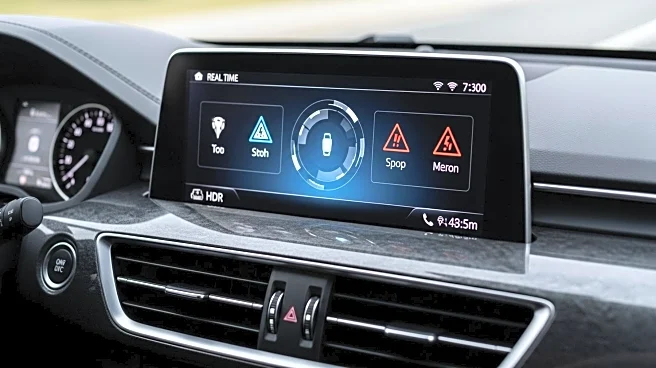What's Happening?
Waze has launched a new feature called 'Conversational Reporting' that allows users to report road hazards using voice commands. This feature, announced last year, utilizes natural language processing to enable drivers to report issues such as road obstructions, construction zones, and speed traps without needing specific voice commands or additional button presses. The system leverages AI capabilities to interpret the user's spoken input and update the map with real-time hazard information. Initially available in a limited beta, the feature is now being rolled out more broadly. However, some users have reported bugs, including persistent pop-up notifications and media playback interruptions.
Why It's Important?
The introduction of 'Conversational Reporting' by Waze represents a significant advancement in navigation technology, enhancing user experience by simplifying the process of reporting road conditions. This development is crucial for improving traffic management and safety, as real-time hazard reporting can help drivers make informed decisions and avoid potential dangers. The feature's reliance on AI highlights the growing integration of artificial intelligence in everyday applications, potentially setting a precedent for other navigation and mapping services. The broader rollout of this feature may also influence how transportation agencies and city planners utilize crowd-sourced data for infrastructure planning and traffic management.
What's Next?
As Waze continues to expand the availability of 'Conversational Reporting,' it is likely that the company will address the reported bugs to improve user experience. The success of this feature could lead to further innovations in voice-activated navigation tools, potentially prompting competitors to develop similar technologies. Additionally, transportation agencies might explore partnerships with Waze to leverage real-time data for traffic management and infrastructure development. The ongoing evolution of AI-driven navigation tools may also prompt discussions on data privacy and the ethical use of user-generated information.
Beyond the Headlines
The deployment of AI in navigation apps like Waze raises questions about data privacy and the ethical use of user-generated information. As these technologies become more prevalent, there may be increased scrutiny on how companies collect, store, and utilize data from users. Furthermore, the reliance on AI for interpreting natural language inputs could lead to discussions about the accuracy and reliability of such systems, especially in diverse linguistic regions. The integration of AI in everyday applications also highlights the broader trend of automation and its impact on various industries.









